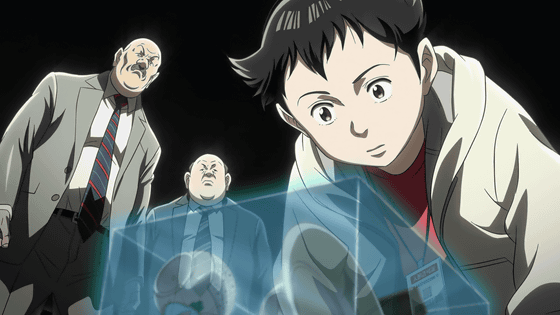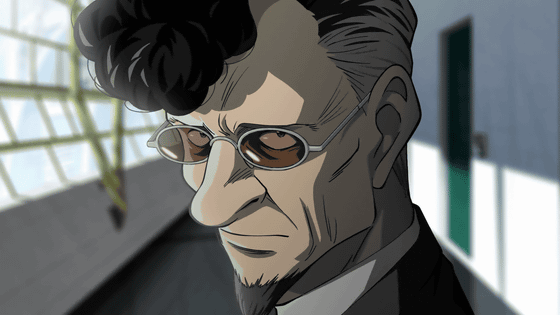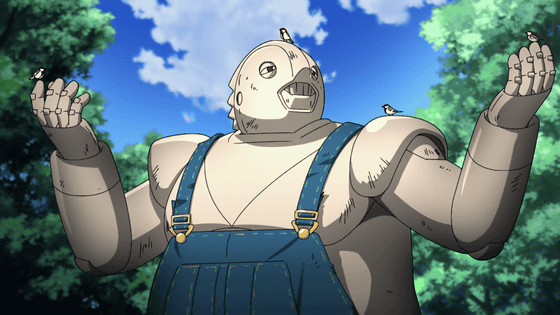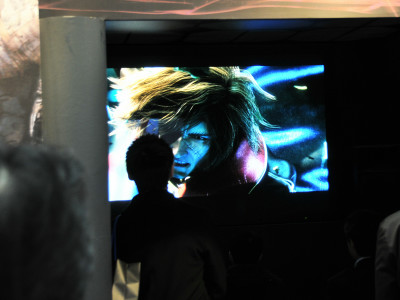Interview with Executive Producer Masao Maruyama, who worked on the anime 'PLUTO' with the feeling that 'I won't die unless I complete it'

Distribution of the anime 'PLUTO' based on Naoki Urasawa's manga began on Netflix from 16:00 on Thursday, October 26, 2023. Masao Maruyama, chairman of the animation production company MAPPA, who is known as a heavyweight in the Japanese animation world, played a major role in making this work into an anime. We spoke to Mr. Maruyama, who was involved in this work from the planning stage as an executive producer, about various things.
PLUTO | Netflix Official Site
We interviewed Mr. Maruyama in 2016 when the movie version of ``GARO - DIVINE FLAME -'' was released.
'The anime version of Garo is the work I wanted to do the most in my 50 years of anime life', interview with Masao Maruyama - GIGAZINE

We also conducted an interview with Naoki Urasawa, the author of PLUTO.

GIGAZINE (hereinafter referred to as G):
Thank you for your continued support today.
Mr. Masao Maruyama (hereinafter referred to as Maruyama):
Nice to meet you, Maruyama. Have you seen “PLUTO”?
G:
yes. I was overwhelmed by the 8 hour long story.
Maruyama:
Hahaha (lol)
G:
Let's start with the story, but speaking of Mr. Maruyama, he is a living dictionary who has been involved in animation since the days of ``Astro Boy'' at Mushi Productions. On the other hand, Naoki Urasawa's works include ``YAWARA!!'', ``Master Keaton'', and ``MONSTER'', so it seemed very natural for me to be involved in ``PLUTO''. In Mr. Urasawa's case, he encountered ``The Largest Robot on Earth'' at the age of 5, and it was a work that had a great impact on him, but for Mr. Maruyama, what kind of work was ``The Largest Robot on Earth'' and ``PLUTO''? Is that the impression you get?
Maruyama:
Hmm, maybe it's better not to say this too much (lol)
G:
(lol)
Maruyama:
When I worked on ``Astro Boy,'' I was just starting out, and I didn't know anything about animation, so I just helped out a little bit, and at Mushi Productions, I worked on ``W3'' and ``Goku's Great Adventure,'' which were so-called marginal, but not mainstream. I was in charge of something that didn't exist. When I saw Atom in my 20s, I thought he was such a healthy and energetic kid. I was just watching the TV anime version, but I thought, ``She's too nice, so I don't like her.''
G:
Wow.
Maruyama:
20 or 30 years later, when I read the manga version again, I realized that Astro Boy was a child sold to the circus by his creator, Dr. Tenma. When I realized that he wasn't just a cheerful guy who was just trying to defeat bad guys for the sake of world justice, I thought, ``Wow, Atom is amazing!''
G:
I see.
Maruyama:
I thought I didn't really like Astro Boy, but now that I'm in my 40s and 50s, I've realized that there's something deeper behind him. That's how ``Atom Urasawa'' was made, and when I first added a little voice, Mr. Urasawa scolded me once.
G:
I got scolded?
Maruyama:
Please don't make Astro Boy too energetic. I wanted it to have a slightly sad feeling, or something like that. The scene that Mr. Urasawa just saw was the scene where Atom is working hard, and of course that's the way it's made, and I understand it when I make it.

Maruyama:
But in that sense, if you're like me and only know about the TV anime Atom and not Tezuka's manga, you might feel a slight difference. In the TV anime, Atom's activities as a robot are heavily featured, but Dr. Tenma thinks that ``My son is not this perfect'' and ``Robots are boring because they are perfect.'' But perfection is what makes it amazing. I think we were able to successfully accomplish such a complex project this time, including Mr. Urasawa.
Dr. Tenma from “PLUTO”

G:
I see. Mr. Maruyama is participating in this work as an executive producer. This position is called ``executive producer,'' and there are people who are the type of person who leaves things to you and say, ``I'll take responsibility if anything happens, so please do as you like,'' and people who are actively involved in the actual work. I think it varies. In your case, what kind of role did you play?
Maruyama:
First and foremost is planning. When PLUTO started, Mr. Urasawa asked me to write an afterword for the book, so I immediately wrote, ``If this is going to be made into an anime, I have no choice but to do it'' (lol)
G:
(lol)
Maruyama:
Also, I have to take responsibility (laughs) Of course, I really wanted to do it. As soon as the series started, I said, ``I want to do it.'' The original work is Astro Boy's ``The Largest Robot on Earth'', so I thought it would end in about 4 volumes, but it kept going on and on, and it didn't end until the 6th volume...That's how I feel. I said, 'I can't do something like this' (lol)
G:
Yeah (lol)
Maruyama:
With such a large volume, it is impossible to do it in the current Japanese anime world. People say, ``I told you I'd do it, right?'' but that was based on about four volumes, and even though I'm no longer in charge of the fact that it's so long and all the cuts have to be done properly, We have repeatedly declined requests because it is impossible to assemble a team that takes into account money and time in the Japanese anime world. I'm getting close to my age, so I can't guarantee that I'll be alive, so I can't do it.
G:
No no (lol)
Maruyama:
However, I felt that I had no choice but to do it...Now that I think about it, maybe it's because of PLUTO that I'm still alive and well. It wouldn't have been so surprising if I had died at 75 or 78 before that, but I feel like the reason I'm still going strong even at 80 is because I felt like I couldn't die unless I completed PLUTO. I guess so.
G:
I see……. In an interview published in ASCII, he talked about how he got scolded by Mr. Urasawa when he was working on the design of the robot in advance. You were not only involved in planning, but also in the practical aspects of the project.
Maruyama:
I agree. This time, I told Mr. Urasawa that I wanted to shorten the project to about 4 volumes because I wanted to do the project this way. When I did that, he said, ``If you can do it, go ahead and do it.''
G:
(lol)
Maruyama:
For the first two years or so, I tried my best and thought about where I could improve, but I came to the conclusion that this was impossible. As long as I do it, I have to do it properly. And even if I die during the process, I have to come up with a concept and do it properly so that someone else can do it properly later. I realized that it would be boring if the content was reduced to a digest, and I shouldn't do it, so I decided that I had no choice but to do it all.
G:
oh…….
Maruyama:
So, when I thought about doing a robot, I ordered a fairly famous designer to create a modern robot design instead of the one drawn by Mr. Urasawa, and when I showed it to Mr. Urasawa, he scolded me. Ta.
G:
Did you get scolded?
Maruyama:
``This is an arrangement of Osamu Tezuka's robots in Naoki Urasawa's style.'' ``The difference with the one I ordered is that it is a robot with joints.It is a so-called real robot after ``Gundam.'' 'Tezuka robots are different. They're short, they don't have joints, and they don't have that kind of detail.' Astro Boy is humanoid and has skin sensations, but there are robots like that, and robots that help people, and robots that do things like cleaning.There are several stages, but at least there are robots that have joints and move like humans. Visually, it's impossible in this world.
G:
It's true that robots like Robita don't have joints.
Montblanc, a kind-hearted robot that works as a mountain guide and rescues people in the Alps

Maruyama:
Also, Mr. Urasawa went through a lot of pain while drawing ``Pluto,'' so he thought that if he wanted to make an anime, he would have to suffer the same way. So, after the project was completed, I reported, ``It was quite a pain.''
G:
(lol)
Maruyama:
I'm glad it turned out to be a funny story (lol)
G:
This volume is certainly difficult. This time, they came up with the idea of streaming, saying, ``Each episode doesn't have to be 30 minutes long,'' and that was a big factor in making it a reality.
Maruyama:
To bring an anime to the world, you have to make it into a series with each episode being 30 minutes long, or make it into a 2-hour feature film, or try your best to make it into a 4-hour feature film. However, I wanted to keep the volume and overall flow of this work intact, without having to limit it to a 30-minute time frame, or to fit it into a 2- or 4-hour time frame, without sacrificing anything. I wanted to do this exactly. I was really worried about whether there was any point in making it into an anime if it stayed true to the original work. In short, I think it's fine to leave the worldview of the original work as it is. I think it's bad for an anime to have boring pictures and volume compared to the original work.
G:
Hmm.
Maruyama:
That's what I was most worried about, but Mr. Urasawa gave me the theme from the beginning, saying, ``We've done Master Keaton and Monster, so this time it has to be better than that.'' Keep it up.
G:
Tough (lol)
Maruyama:
Nowadays, it's impossible for someone to give me more time and money than I had for those works, so I said I couldn't do it, but luckily this project was completed, so I decided to do my best until I could do it. . In that sense, I think I may have tried too hard in some areas (lol), but having worked so hard to finish it, I really feel like I'm still alive.
G:
I thought that the style of starting the main story with a short 30-second opening is something that is difficult to achieve in TV animation.
Maruyama:
There are cases in which the opening scene is a video that shows the whole story, but since this film has some mystery parts, I thought it would be unpleasant to have the latter half of the film shown from the beginning. However, as for the form of the work, I wanted something with an impact at the beginning, so I came up with a plan to use Mr. Urasawa's original drawings, and to arrange them well and show them as a video rather than as an animation drawing. .
G:
There are some memorable songs in the film, and these were composed by Mr. Urasawa, and when I asked Mr. Urasawa about it , he said, ``Mr. Urasawa knows this song best, so please tell me.'' It was something that was given to me. Mr. Maruyama, did you know from the beginning that Mr. Urasawa had a specific song in mind?
Maruyama:
Mr. Urasawa is both a manga artist and a musician, so when he's drawing his own manga, he has various sound images in mind, so he's always asked, ``What kind of melody is this?'' For example. Is this what it's like?'' I wonder if I can understand. However, just when I was wondering whether it was ``Yes'' or ``No,'' Mr. Urasawa made a demo and brought it to me.
G:
(Laughs) Was it really unexpected that the demo sound source came out?
Maruyama:
Well...I was somewhat expecting it (lol) I was spoiled by that. In the end, it will be arranged for performance, but the image of the original work is very important in many ways. Specifically, for the first episode's music, I used the demos, such as how the guitar sounds like this, and the part where the children sing at the end, with some arrangement after receiving demos.
G:
Have you ever given any kind of advice directly to the field, or been asked for help by the field?
Maruyama:
It happens every time in the studio (lol)
G:
Regarding this work, I heard that Netflix told me to 'wait until it's ready,' so I thought from the outside that the schedule was a little easier, but that would cause other problems. Shall we?
Maruyama:
You spent too much time in the beginning. The first five years. If that had been completed in two years, I might have had a little more leeway at the end. The fact that I went through a lot of trial and error before deciding that I wanted to do something was a factor in my ability to finally complete it. I feel like if I had just finished it, I could have created something even more amazing...When I have time, I tend to take things too slowly, so I tend to take things a bit more seriously.
G:
Hmm.
Maruyama:
This time I was careful from the beginning, but there were some parts where I was a little too careful, so I think the whole thing might have been more cohesive if the parts were shortened and done all at once...I can say this now that it's finished. At that time, I was thinking that it would take five years, and it wasn't because I was playing around that it took five years. Having time to do things carefully isn't necessarily a good thing, either in a good or bad sense.
G:
I see. I often hear about the difficulty of adjusting schedules in various works.
Maruyama:
It's a question of time allocation. The first five years spent on the project amounted to less than a day in production. However, it is precisely because of this that it is complete. However, compared to other works, I believe that the time and effort it took to create this work allowed me to fully experience what Mr. Urasawa calls ``the pain of making something.'' I think those who have watched 8 hours will understand that this is not something that can be done easily.
G:
Although the distributed work is divided into 8 episodes, it felt like I had watched several movies...
Maruyama:
It's very rare for an hour-long movie to work as a work without being divided into 30-minute sections. Moreover, there are 8 episodes. I don't think there will be many cases like this in the future, including how they are made. I myself am physically unable to do anything in the future.
G:
Mr. Maruyama says that his work policy is to ``make it in time,'' and in that sense, he says, ``I don't think it will be possible to create a complete version of the anime.'' I think this work can be said to be a very complete anime.
Maruyama:
Yes, I hope you have enough time. However, when I say 'I'll make it in time,' I'm actually talking about the last month. For example, it is difficult to know whether the product will be good even if you push the delivery back two weeks and try your best. Even though the deadline was already here, I thought it would be fine if we all worked together to finish the project, saying, ``We'll do whatever we can.'' If the most difficult scene in a storyboard is something that would definitely take a month to complete, I may leave it out and finish it. However, it's natural to create something so that when it's finished, people won't think, ``It's boring because that scene wasn't there.'' As those of us who created the storyboards, we think, ``If only we had that scene...'', but as a film, we make something that can be fully seen even without that scene. And don't miss the schedule and meet the deadline.
G:
HM…….
Maruyama:
``Meeting delivery deadlines'' does not mean ``cutting corners,'' but it is a matter of meeting various constraints such as money, time, and people. I think it's better to think about what kind of product you want to create and control it, rather than forcing them to work even harder when they're working hard to the limit. Instead of thinking, ``If we just postpone it for one more week, it will be better,'' but let's try to make it end there. I always create things with this in mind.
G:
I heard that Mr. Maruyama is working on this work with enthusiasm, saying, ``I want to do my best as my last job.'' In 2020, he was buried before his death.
Masao Maruyama's funeral was held on his 81st birthday. However, I am still in good spirits and my desire to work on the work I want to do remains the same. Industry officials and legends gathered at the venue to hear about Mr. Maruyama's many years of accomplishments. I was able to meet Mr. Gisaburo and Mr. Morimoto. It looks like the late Osamu-chan is also coming. pic.twitter.com/tArh7QROoR
— Rumiko Tezuka (@musicrobita) June 19, 2022
G:
However, when you actually complete a work like this, don't you feel a desire or thought, 'Okay, next...'?
Maruyama:
As for that, even though the work was completed, I was still 'a carp on the chopping block' (lol)
G:
(lol)
Maruyama:
What do you think about this 'PLUTO'? It's up to each person whether they praise me and say, ``You did a good job,'' or ``Maybe I should try a little harder.'' I'm currently waiting with my neck fully exposed, and depending on the situation, my head may just fly off. I am living a very anxious life due to my current condition. Even if it's a lie, I want them to say, ``Good job'' and ``I'm glad.''
G:
Ah, I guess everyone hasn't seen it yet.
Maruyama:
That's right. After all, I'm concerned about the reputation of my work, and if someone says, 'No,' I don't think there'll be a next time, but if someone says, 'You did a good job,' or 'That's great,' then I say, 'I want to do my best next time.' Right now, I'm at the point where I'm most anxious: anyone can pull my head out at any time.
G:
I see. At least I sat through the 8-hour epic and was very moved by the end. Thank you for making this film a reality. I'm glad that you took the time to talk to me.
Maruyama:
good. thank you very much.
All 8 episodes of the Netflix series ``PLUTO'', which Mr. Maruyama created with the determination that ``this may be his last job,'' will be distributed from 16:00 on Thursday, October 26, 2023.
PLUTO | Netflix Official Site
https://www.netflix.com/jp/title/81281344
'PLUTO' Trailer - Netflix - YouTube
Related Posts:






